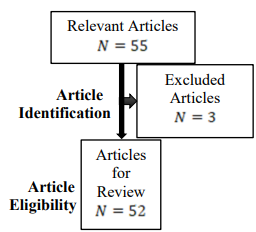
Submission to VIJ 2024-08-29
Keywords
- Research,
- Self-Regulated Learning,
- Systematic Literature Review
Copyright (c) 2024 Okta Kurnia Wati

This work is licensed under a Creative Commons Attribution 4.0 International License.
Abstract
In learning, the skills developed are not only cognitive but also affective, such as self-regulated learning. Research on self-regulated learning has been extensively studied by researchers. Given this background, this study aims to examine the developments in research on self-regulated learning in mathematics education. For this purpose, the researcher reviewed 55 articles from journals accredited by the Science and Technology Index (SINTA 1 and SINTA 2). This research used a Systematic Literature Review (SLR) method with a primary focus on self-regulated learning research. The findings indicate instability in the publication of self-regulated learning articles over the years up to 29 November 2023. Based on these results, the researcher recommends that other researchers increase the diversity of rarely conducted types of research, such as Research & Development (R&D), aimed at developing products that can enhance self-regulated learning and support the research trends in self-regulated learning in the field of mathematics education.
References
- Tanujaya, B., Mumu, J., & Margono, G. (2017). The Relationship between Higher Order Thinking Skills and Academic Performance of Student in Mathematics Instruction. International Education Studies, 10(11), 78. https://doi.org/10.5539/ies.v10n11p78
- Zimmerman, B. J. (1990). Self-Regulated Learning and Academic Achievement: An Overview. Educational Psychologist, 25(1), 3–17. https://doi.org/10.1207/s15326985ep2501_2
- Febriyanti, F., & Imami, A. I. (2021). Analisis Self-Regulated Learning dalam Pembelajaran Matematika Pada Siswa SMP. Jurnal Ilmiah Soulmath: Jurnal Edukasi Pendidikan Matematika, 9(1), 1–10. https://doi.org/10.25139/smj.v9i1.3300
- Kurnia, D., & Warmi, A. (2020). Analisis Self-Regulated Learning dalam Pembelajaran Matematika padaSiswa SMP Kelas VIII Ditinjau dari Fase-fase Self-Regulated Learning. Prosiding Sesiomadika, 2(1b), 386–391.
- Hapsari, I. I., & Fatimah, M. (2021). Inovasi Pembelajaran Sebagai Strategi Peningkatan Kualitas Guru Di SDN 2 Setu Kulon. Standarisasi Pendidikan Sekolah Dasar Menuju Era Human Society 5.0, 187–194.
- Tamur, M., Ndiung, S., Weinhandl, R., Wijaya, T. T., Jehadus, E., & Sennen, E. (2023). Meta-Analysis of Computer-Based Mathematics Learning in the Last Decade Scopus Database: Trends and Implications. Infinity Journal, 12(1), 101–116. https://doi.org/10.22460/infinity.v12i1.p101-116
- Yunita, Y., Juandi, D., Tamur, M., Adem, A. M. G., & Pereira, J. (2020). A Meta-Analysis of The Effects of Problem-Based Learning on Students’ Creative Thinking in Mathematics. Beta: Jurnal Tadris Matematika, 13(2), 104–116. https://doi.org/10.20414/betajtm.v13i2.380
- Sunarto, M. J. D., & Koentjoro, E. Y. (2023). Self-Regulated Learning in Mathematics Learning: Design of Learning Model Based on Bibliometric Analysis. AKSIOMA: Jurnal Program Studi Pendidikan Matematika, 12(2), 1778–1788.